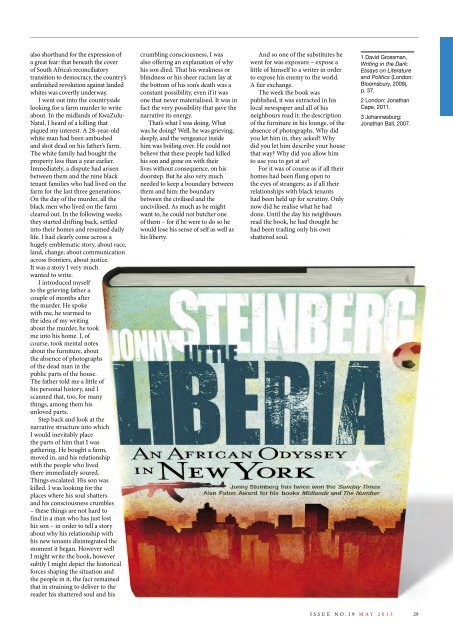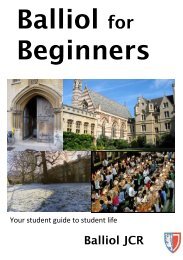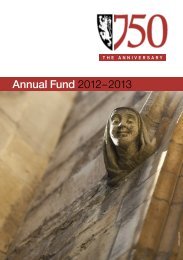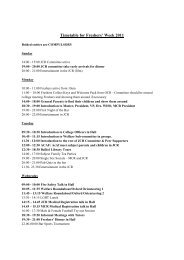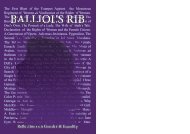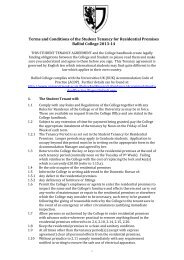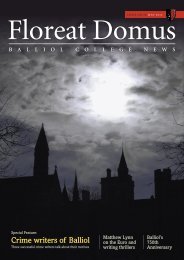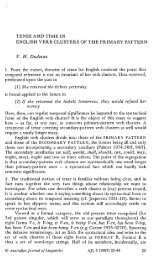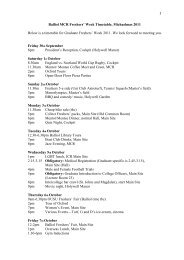Issue 19, 2013 - Balliol College - University of Oxford
Issue 19, 2013 - Balliol College - University of Oxford
Issue 19, 2013 - Balliol College - University of Oxford
Create successful ePaper yourself
Turn your PDF publications into a flip-book with our unique Google optimized e-Paper software.
also shorthand for the expression <strong>of</strong><br />
a great fear: that beneath the cover<br />
<strong>of</strong> South Africa’s reconciliatory<br />
transition to democracy, the country’s<br />
unfinished revolution against landed<br />
whites was covertly underway.<br />
I went out into the countryside<br />
looking for a farm murder to write<br />
about. In the midlands <strong>of</strong> KwaZulu-<br />
Natal, I heard <strong>of</strong> a killing that<br />
piqued my interest. A 28-year-old<br />
white man had been ambushed<br />
and shot dead on his father’s farm.<br />
The white family had bought the<br />
property less than a year earlier.<br />
Immediately, a dispute had arisen<br />
between them and the nine black<br />
tenant families who had lived on the<br />
farm for the last three generations.<br />
On the day <strong>of</strong> the murder, all the<br />
black men who lived on the farm<br />
cleared out. In the following weeks<br />
they started drifting back, settled<br />
into their homes and resumed daily<br />
life. I had clearly come across a<br />
hugely emblematic story, about race,<br />
land, change; about communication<br />
across frontiers, about justice.<br />
It was a story I very much<br />
wanted to write.<br />
I introduced myself<br />
to the grieving father a<br />
couple <strong>of</strong> months after<br />
the murder. He spoke<br />
with me, he warmed to<br />
the idea <strong>of</strong> my writing<br />
about the murder, he took<br />
me into his home. I, <strong>of</strong><br />
course, took mental notes<br />
about the furniture, about<br />
the absence <strong>of</strong> photographs<br />
<strong>of</strong> the dead man in the<br />
public parts <strong>of</strong> the house.<br />
The father told me a little <strong>of</strong><br />
his personal history, and I<br />
scanned that, too, for many<br />
things, among them his<br />
unloved parts.<br />
Step back and look at the<br />
narrative structure into which<br />
I would inevitably place<br />
the parts <strong>of</strong> him that I was<br />
gathering. He bought a farm,<br />
moved in, and his relationship<br />
with the people who lived<br />
there immediately soured.<br />
Things escalated. His son was<br />
killed. I was looking for the<br />
places where his soul shatters<br />
and his consciousness crumbles<br />
– these things are not hard to<br />
find in a man who has just lost<br />
his son – in order to tell a story<br />
about why his relationship with<br />
his new tenants disintegrated the<br />
moment it began. However well<br />
I might write the book, however<br />
subtly I might depict the historical<br />
forces shaping the situation and<br />
the people in it, the fact remained<br />
that in straining to deliver to the<br />
reader his shattered soul and his<br />
crumbling consciousness, I was<br />
also <strong>of</strong>fering an explanation <strong>of</strong> why<br />
his son died. That his weakness or<br />
blindness or his sheer racism lay at<br />
the bottom <strong>of</strong> his son’s death was a<br />
constant possibility, even if it was<br />
one that never materialised. It was in<br />
fact the very possibility that gave the<br />
narrative its energy.<br />
That’s what I was doing. What<br />
was he doing Well, he was grieving,<br />
deeply, and the vengeance inside<br />
him was boiling over. He could not<br />
believe that these people had killed<br />
his son and gone on with their<br />
lives without consequence, on his<br />
doorstep. But he also very much<br />
needed to keep a boundary between<br />
them and him: the boundary<br />
between the civilised and the<br />
uncivilised. As much as he might<br />
want to, he could not butcher one<br />
<strong>of</strong> them – for if he were to do so he<br />
would lose his sense <strong>of</strong> self as well as<br />
his liberty.<br />
And so one <strong>of</strong> the substitutes he<br />
went for was exposure – expose a<br />
little <strong>of</strong> himself to a writer in order<br />
to expose his enemy to the world.<br />
A fair exchange.<br />
The week the book was<br />
published, it was extracted in his<br />
local newspaper and all <strong>of</strong> his<br />
neighbours read it: the description<br />
<strong>of</strong> the furniture in his lounge, <strong>of</strong> the<br />
absence <strong>of</strong> photographs. Why did<br />
you let him in, they asked Why<br />
did you let him describe your house<br />
that way Why did you allow him<br />
to use you to get at us<br />
For it was <strong>of</strong> course as if all their<br />
homes had been flung open to<br />
the eyes <strong>of</strong> strangers; as if all their<br />
relationships with black tenants<br />
had been held up for scrutiny. Only<br />
now did he realise what he had<br />
done. Until the day his neighbours<br />
read the book, he had thought he<br />
had been trading only his own<br />
shattered soul.<br />
1 David Grossman,<br />
Writing in the Dark:<br />
Essays on Literature<br />
and Politics (London:<br />
Bloomsbury, 2009),<br />
p. 37.<br />
2 London: Jonathan<br />
Cape, 2011.<br />
3 Johannesburg:<br />
Jonathan Ball, 2007.<br />
issue no.<strong>19</strong> MAY <strong>2013</strong><br />
29


